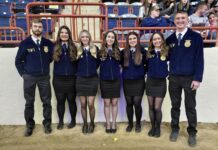How do you plan for the summer without knowing what the pandemic situation will look like months from now?
“We’re trying to prepare, hoping for the best and, I guess, preparing for the worst,” said Lisa Ingram, 4-H youth development agent for Marshall County, West Virginia.
Only a handful of West Virginia fairs and festivals went on in 2020, said Kelly Collins, president of the West Virginia Association of Fairs and Festivals, and chief executive officer of the West Virginia State Fair. Restrictions lifted briefly over the summer, allowing a few to operate, but an executive order in July shut down the rest of the fairs in the state. Fairs got some funding from the state to help them stay afloat after the July order.
“Thankfully, we did get some financial assistance, but it’s still a struggle,” Collins said. “We lost all of our revenue for an entire year.”
Fairs and 4-H’ers in the state are still waiting on official restrictions and rules for 2021. The state fair, along with many others, are planning full fairs, knowing there will be some restrictions and expecting to make adjustments.
“Since it takes so long for us to plan an event of this size, we have to start now,” Collins said. “Of course, safety is going to come first.”
In the mean time, she added, many fairs have transitioned from tourism destinations to vaccination sites. With vaccination rates going up, she is hopeful about the summer.
“We can’t do our job until the health officials can do theirs,” she said.
Enrollment
Carole Scheerbaum, Jason Rine and Dianna Lewis, 4-H youth development agents for Hancock, Brooke and Pleasants counties, said their counties are having rolling enrollment for 4-H this year, as opposed to a hard deadline.
“We recognize that everyone’s schedule has just been upended,” Scheerbaum said. “If a 4-H’er wants to join later on, that’s fine this year.”
Lewis said numbers have been down so far, but she’s not surprised.
“I think that was to be expected when a lot of the things that they were able to do in the past were not being offered last year, especially summer programming,” Lewis said.
In Marshall County, Ingram said, about 170 4-H’ers have signed up so far, compared to 380 in 2020, which is a more typical number — enrollment started in October, before the pandemic hit.
She does worry about the lower numbers, but is hopeful that virtual camps and other events can help keep 4-H’ers engaged.
“We have really tried to focus on the kids that have participated in our programs … it’s given them some sense of community; it’s given them contact with other kids, especially when they were not in school,” Ingram said. “You have to look at it that the kids that are needing to be there and wanting to be there are able to be there.”
“It is a fear that once we’ve lost them, that we’re not going to get that number back up,” Lewis said. “But we’re hopeful.”
Extension agents have been offering a lot of virtual programming, but are hoping to keep shifting back to more in person programs if COVID-19 cases continue going down and vaccination rates continue going up.
Fairs and 4-H in Pennsylvania are also beginning to plan for the 2021 fair season.
Meetings
Clubs got the green light to start meeting in person again in March, though they were still limited to 10 people or less. Extension agents are expecting to see that number grow to 25, and, hopefully, increase from there if things go well.
Things in Ingram’s county have been mostly virtual, since most of the clubs are larger than 10 people, and she wants to keep things fair for larger clubs, as well.
Summer plans
One thing extension agents know they will not be able to do this year is traditional residential camps. Some are looking at a mix of in person day camps and virtual camps.
Ingram is also on the fair board for the Marshall County Fair. She said the fair board is planning for a full fair, but still waiting on guidance from the state.
“We don’t have a lot of choice other than early planning,” she said.
Hancock County extension is planning to host master gardener classes, a farmers market, a summer reading program for youth in kindergarten through third grade and several day events for 4-H’ers.
“The wheels are turning,” Sheerbaum said. “We’re looking forward to getting them rolling pretty well over the next year or so.”
2020
The fair in Scheerbaum’s area, Hancock County Oldtime Fair, was canceled last year, but is starting to put plans in place for this year in September. Organizers are hoping things will be ready to go by that point.
Pleasants County held virtual shows and sales in 2020, but a good number of 4-H’ers chose not to join.
“When we were uncertain about … if we were going to be able to have our traditional fair, we asked our kids to hold off on buying animals,” Lewis explained.
Some 4-H’ers decided not to do the virtual shows and sales because they weren’t sure how well the online format would work out. Some did non livestock projects, instead.
In Marshall County, volunteers organized shows and sales, separate from the fair and 4-H, for steer, lamb and hog projects after the executive order closed the fair the week before it was scheduled. But to complete their 4-H projects, 4-H’ers just finished their project books and sent in photos of their project animals, or of their non livestock projects.
Ingram is hoping to keep some of the new ideas community members tried out at that event, including online bidding and livestreaming shows for people who can’t be there in person.
“I keep trying to look at positives, and there really were some neat things,” she said.










